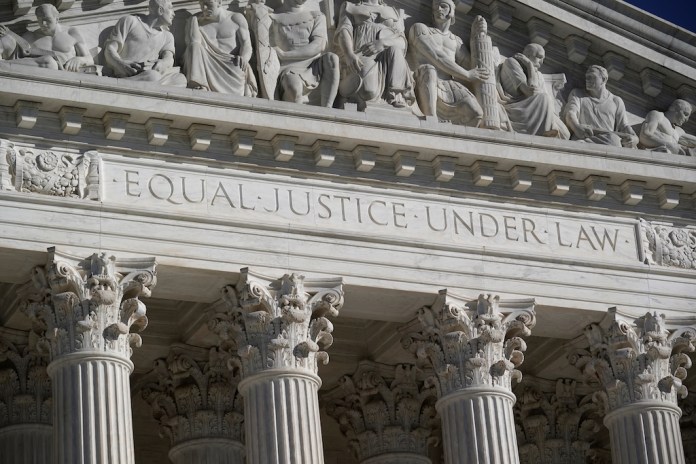Biden lays out plan to ‘reform’ Supreme Court in waning days of his presidency – Washington Examiner
In a recent address, President Joe Biden proposed “three bold reforms” to reshape the Supreme Court as he approaches the end of his presidency. He seeks to bolster trust and accountability in the judiciary, claiming recent rulings have eroded public confidence in the court.
One major reform Biden advocates is the introduction of term limits for Supreme Court justices—specifically, 18-year terms—with a new appointment occurring every two years. He believes this would promote a more dynamic court composition and prevent significant shifts resulting from a single presidency.
Additionally, Biden proposed a constitutional amendment titled the “No One Is Above the Law Amendment,” aiming to eliminate presidential immunity for actions taken while in office. This proposal addresses a recent Supreme Court decision that upheld a degree of immunity for presidents, but passing this amendment would require broad legislative support, making its adoption uncertain.
Biden criticized the current ethics code for the Supreme Court as inadequate and called for stronger enforcement mechanisms. His proposals reflect an effort to confront perceived challenges to judicial integrity and to encourage a more accountable legal system.
In his recent address, President Joe Biden put forward a plan for “three bold reforms” aimed at overhauling the Supreme Court in the final days of his presidency. His proposals are designed to enhance trust and accountability within the judiciary and restore public confidence in the court’s decisions, which he argues have been undermined by recent rulings.
Biden emphasized the need for term limits for Supreme Court justices, suggesting they should serve 18-year terms, allowing for a new appointment every two years. He believes this change would help ensure more regular updates to the court’s composition and prevent drastic shifts in its makeup over generations.
Additionally, Biden advocated for a constitutional amendment, the “No One Is Above the Law Amendment,” which would eliminate presidential immunity for actions taken while in office. This amendment aims to counter a recent Supreme Court ruling that allowed for immunity from prosecution for official acts. However, passing this amendment would require significant legislative approval, making its success uncertain.
Furthermore, Biden criticized the current ethics code for its weaknesses and lack of enforcement, arguing for a more robust framework. his proposals reflect a response to perceived challenges to judicial integrity and aim to foster a more accountable legal system.
Biden lays out plan to ‘reform’ Supreme Court in waning days of his presidency
President Joe Biden unveiled his plan for “three bold reforms” for the Supreme Court Monday, in an alleged attempt to “restore trust and accountability to the court and our democracy.”
Biden argued for his points for reforming the high court and reversing a recent decision made by the court in an opinion piece in the Washington Post. The president, who served in the Senate from 1973 until 2009, argued for term limits, a reformed Supreme Court ethics code, and wiping away immunity for the president for any acts.
“What is happening now is not normal, and it undermines the public’s confidence in the court’s decisions, including those impacting personal freedoms,” Biden wrote. “We now stand in a breach.”
Biden’s first proposal calls for a constitutional amendment, titled the “No One Is Above the Law Amendment,” which he claims would “make clear that there is no immunity for crimes a former president committed while in office.”
The amendment would reverse a recent Supreme Court decision determining the president is immune from prosecution from official acts, but not unofficial acts, committed while in the White House. It would require approval from two-thirds of both chambers of Congress and ratification from three-fourths of states to pass, making it highly unlikely.
Biden also proposed term limits on the Supreme Court, suggesting 18 year terms so that a new justice may be appointed every two years.
“Term limits would help ensure that the court’s membership changes with some regularity. That would make timing for court nominations more predictable and less arbitrary. It would reduce the chance that any single presidency radically alters the makeup of the court for generations to come,” Biden wrote.
Under his three and a half years in the White House, Biden has only had the chance to nominate one justice to the Supreme Court, while his predecessor, former President Donald Trump, had three appointments.
The presidency is currently limited to two full terms, or ten years total, under the 22nd Amendment, while Congress and the Supreme Court have no term limits.
Biden also called the current ethics code “weak and self-enforced,” while calling for a stronger ethics code that would make them “required to disclose gifts, refrain from public political activity and recuse themselves from cases in which they or their spouses have financial or other conflicts of interest.”
Biden writes that “we can and must prevent the abuse of presidential power,” along with restoring “the public’s faith in the Supreme Court.”
“In America, no one is above the law,” he wrote. “In America, the people rule.”
Biden has been at odds with the Supreme Court for his entire presidency, as the conservative majority court has struck down several of his actions as unconstitutional, such as his student loan plan and his attempted COVID-19 vaccine mandate. The high court’s decisions overturning Roe v. Wade and affirmative action also angered Biden, among other opinions delivered.
The plan formulated by the president has garnered criticism over separation of powers issues. With less than six months remaining in Biden’s presidency and a divided Congress, it is unlikely any of the proposed efforts will see congressional approval.
" Conservative News Daily does not always share or support the views and opinions expressed here; they are just those of the writer."




